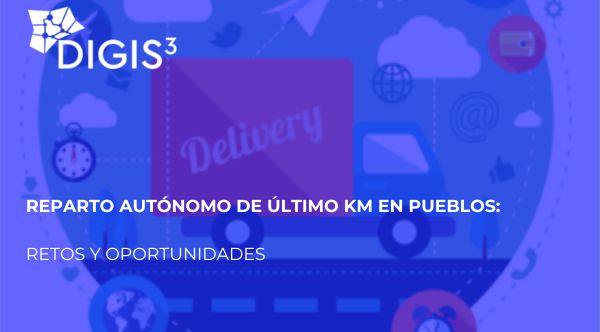Rural logistics is at a turning point. With the rise of e-commerce and an aging population, delivering packages directly to the doorstep—even in scattered villages—has become critical for the competitiveness of small businesses and the quality of local life. Autonomous ground vehicles and delivery drones promise to revolutionize the “last mile,” but the path forward includes technical, regulatory, and social challenges.

Why is it necessary?
Last-mile delivery in rural areas is not just a matter of logistical efficiency, but of territorial equity. In regions with thousands of small municipalities, low delivery frequency and high per-package costs make it urgent to rethink the model. Automation could be key to ensuring continuous and sustainable services, especially in aging or isolated communities. Here are some data points:
- 33% of logistics costs are concentrated in the last few kilometers; in rural settings, this rises to 50% due to low delivery density.
- Spain has over 4,800 municipalities with fewer than 1,000 inhabitants, where basic parcel services are only available 2–3 days a week.
- Companies like Starship Technologies have already surpassed 8 million autonomous deliveries in six countries and are preparing pilots in European university towns for 2026.
Main challenges
Implementing autonomous technologies in rural delivery faces significant barriers. From inadequate connectivity to the need for regulatory adaptation and public trust, each challenge requires specific solutions. Moreover, the economic viability of the model depends on finding ways to balance costs and benefits in low-density environments.
| Challenge | Details |
|---|---|
| 5G/IoT Infrastructure | Irregular coverage hinders remote control and monitoring. |
| Regulation | Road and air safety certification, civil liability, and municipal permits. |
| Public Acceptance | Distrust in technology, drone noise, and coexistence with pedestrians. |
| Business Model | Low average ticket and long routes → tight profitability without subsidies. |
Opportunities for rural areas
Beyond the challenges, autonomous delivery opens a window of opportunity to revitalize rural areas. Cost reduction, improved access to essential goods, lower environmental impact, and positioning as innovative territories are just some of the advantages that can transform local life and attract new investment. Specifically:
- Up to 30% reduction in logistics costs in towns with fewer than 5,000 inhabitants (ETRR estimates, 2024).
- Inclusive access: delivery of medicines and fresh products to elderly or mobility-impaired individuals (Teruel pilot, 2024).
- Lower carbon footprint: electric robots + route optimization → 40% fewer emissions compared to diesel vans.
- Tourism driver: tech demonstrators enhance the “smart village” brand.
Notable cases and pilots
Various initiatives are already demonstrating the potential of autonomous delivery in rural areas. From drones overcoming weather barriers to robots completing deliveries without human intervention, these pilots offer valuable insights and show that technology can successfully adapt to rural realities.
| Location | Technology | Outcome |
|---|---|---|
| Sotres (Asturias) | Correos-Telefónica 5G Drones | Medicine delivery during snowy days. |
| Teruel | Dron Logistic Service | 25% reduction in average delivery time to rural pharmacies. |
| LogiSmile (EU) | Autonomous van + “runner” robots | No human intervention in final urban segment. |
Keys to successful implementation
For autonomous delivery to be a real and sustainable solution in rural areas, strategic planning is essential. This includes mapping connectivity, citizen training, creating smart infrastructure, and evaluating social and environmental impact. Public-private collaboration will be key. Success depends on aspects such as:
- Mapping 4G/5G coverage and planning private LTE or satellite zones.
- Requesting regulatory sandbox from DGT and AESA for controlled trials.
- Designing smart delivery points (lockers, IoT mailboxes) with Correos incentives.
- Educating citizens through demos and surveys.
- Measuring environmental and social ROI from the pilot phase.
How can DIGIS3 support you?
- Mentoring in digital transformation for your business.
- Access to pilots and tech demonstrators.
- Proof of concept and prototype validation.
- Funding search.
- Specialized training.
Contact us at info@digis3.eu to turn your village into a benchmark for sustainable delivery.